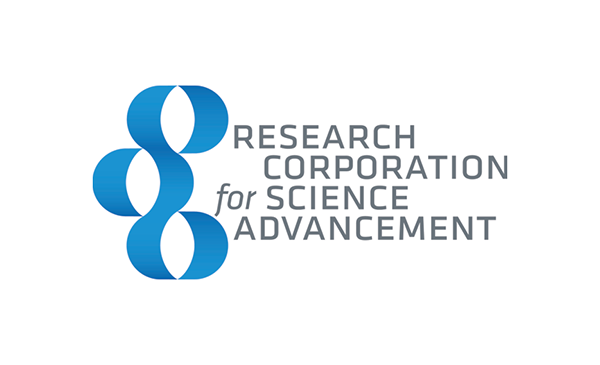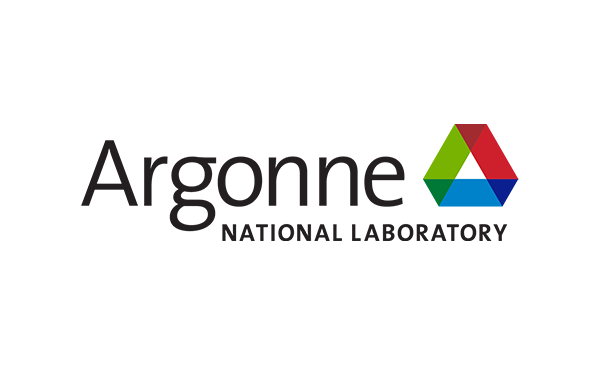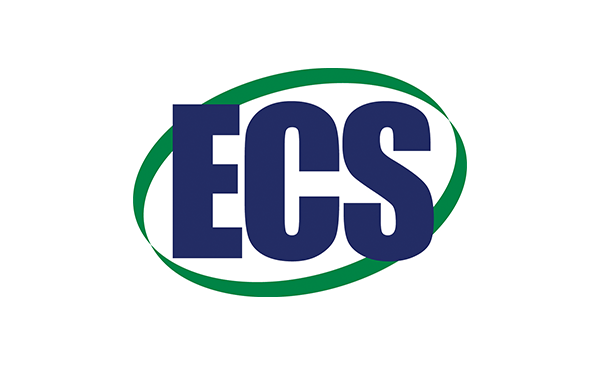Next Generation Electrochemistry
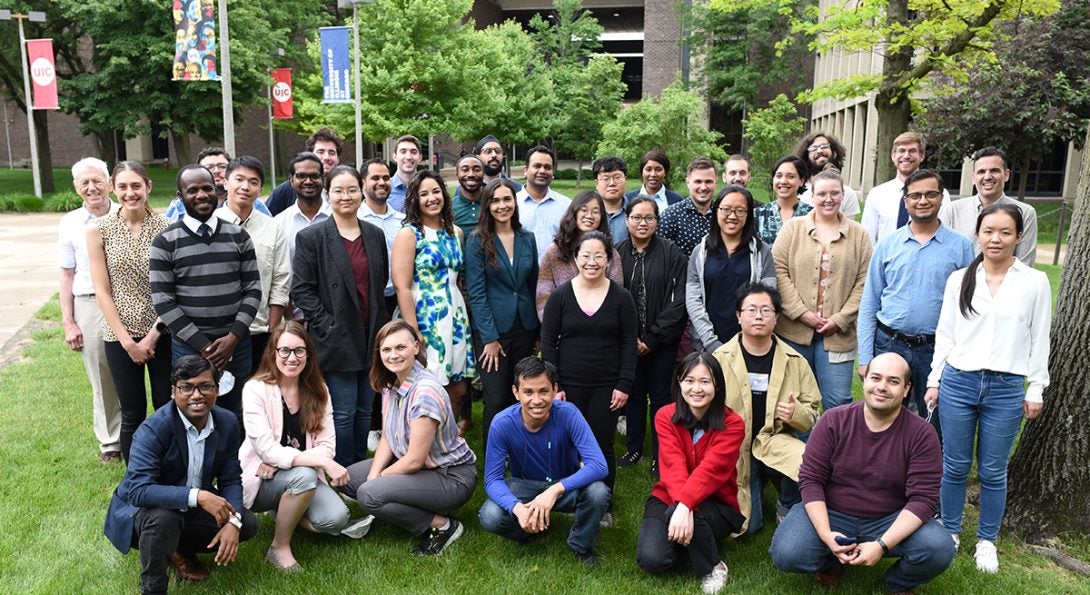
Next Generation Electrochemistry (NGenE) selects up to 40 advanced graduate students and postdocs from around the country to partake in what is an intense week-long summer workshop that explores advanced topics in electrochemistry. They spend five days with ten distinguished researchers and lecturers to identify and elaborate on the most important unsolved electrochemical research challenges. They approach these questions through lectures and discussions, research project planning, mentoring, site visits, and demonstrations. The program takes place at the University of Illinois at Chicago, with a day trip to Argonne National Laboratory for lectures and demonstrations of the Advanced Photon Source and the Joint Center for Energy Storage Research's Electrochemical Discovery Laboratory.
The program prioritizes 1) the discussion of unsolved challenges in electrochemistry that the coming generations will need to address, and 2) the identification of representative innovative, forward-looking multi-modal experiments, theory, and simulation to solve them.
Student Research Projects
Participants are active players during NGenE. Working in teams, they choose one of the top unsolved challenges in electrochemistry and then develop a scientific program to solve the problem through innovative experiments and theory. On the final day of the program, each team presents its findings before their peers and a set of expert judges.
Background Heading link
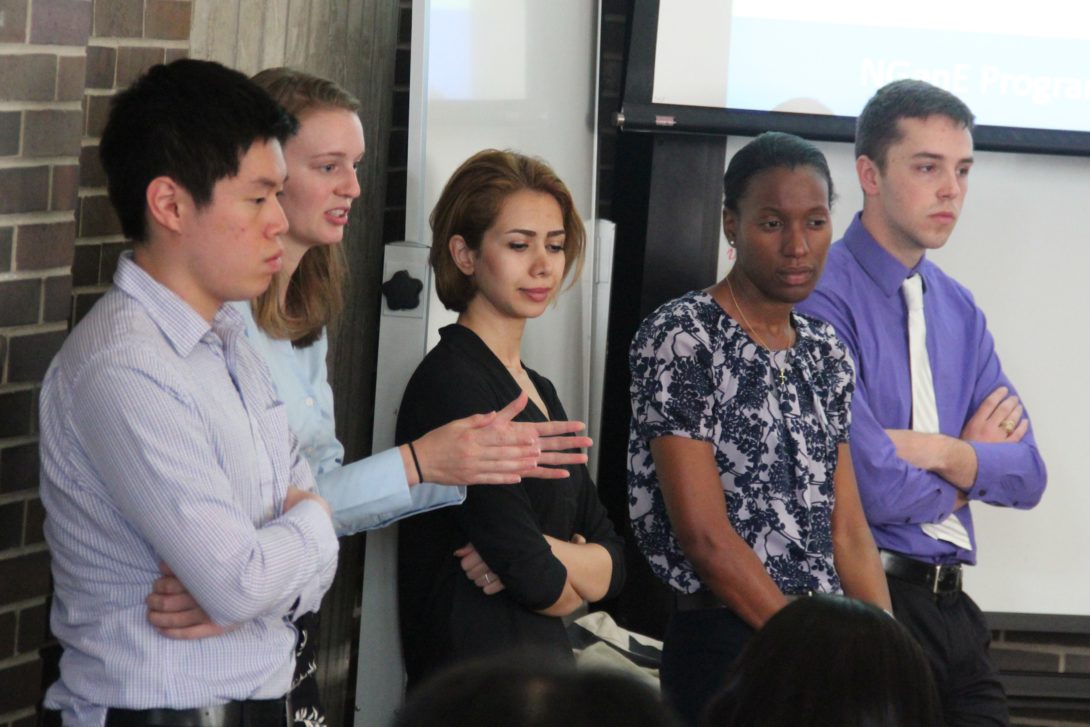
Motivation
Electrochemistry – the manipulation of electrical charge to drive chemical change – is central to applications and devices in fields as varied as medicine, environmental remediation and energy, and integrates concepts spanning chemistry, physics and engineering. Despite its reach and importance, electrochemistry has advanced more slowly over the last two decades than many companion fields such as nanoscience or semiconductors. Next Generation Electrochemistry (NGenE) will focus on the existing and emerging challenges in electrochemistry, and the application of innovative strategies in synthesis, characterization, theory and simulation to address these challenges.
Impact
NGenE is an annual event with content rotating among the unsolved fundamental electrochemical challenges and applications. Students and lecturers spend significant time talking and developing relationships that – we hope! – may become long term mentor-protégé bonds. The most talented students may return for subsequent institutes. With over 30 students per year, NGenE aims to influence the strategic directions of electrochemical science in the United States in the decades to come.
Intellectual Approach
Because the focus is on the frontiers of research and not the intricacies of what is known, NGenE graduate students and postdocs are among the brightest in their fields. The program challenges lecturers and participants to identify the most important questions for next generation research and to design innovative experimental and theoretical approaches to answer these questions. Therefore, participants are expected to absorb and exchange information at a high level. Relevant questions include:
- What are the most important unsolved issues in a given area of electrochemistry?
- What do we know for each part and how do we know it?
- What do we want to know but do not know, and how we would go about finding it out?
- What intuition or experience guides our speculation about what could happen?
NGenE 2023 Heading link
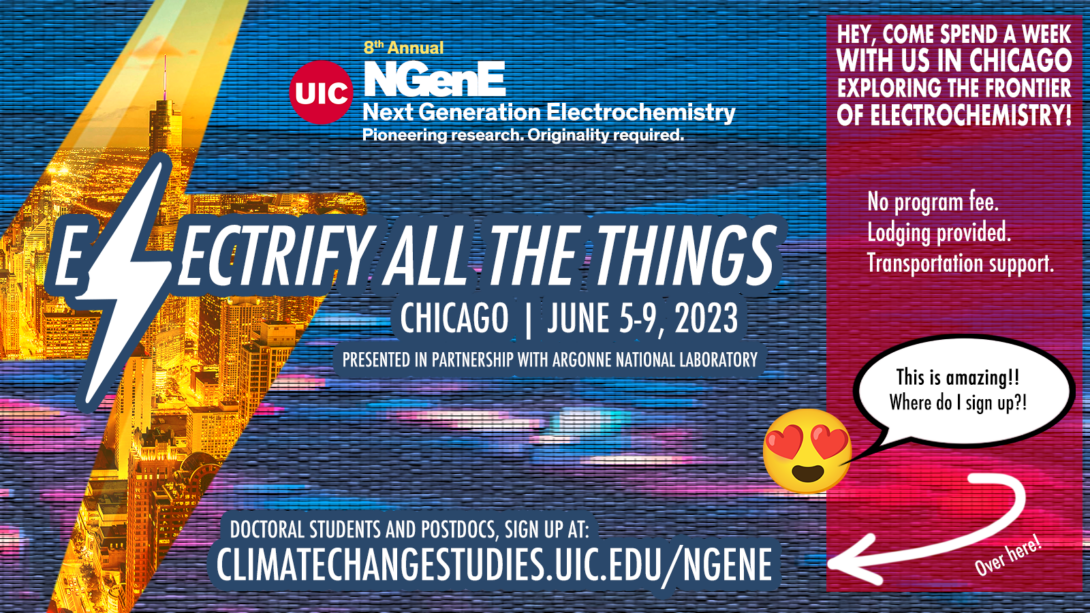
NGenE 2023: Electrify All The Things!
Chicago, IL | June 5-9, 2023
UIC in partnership with Argonne National Laboratory is pleased to present the 2023 installment of NGenE.
Since the industrial revolution, fossil fuels have powered society, and heat has subsequently driven industrial chemical processes. However, with the dawn of the 21st century, energy from renewable sources has steadily and decisively penetrated the market. We are on the cusp of transitioning toward cheap electricity from sustainable and clean sources. The transition will transform how we store and convert energy, but also how we power key chemical transformations and clean our environment. What unifies these processes? Electrochemistry—the science of using electricity to induce chemical change. To electrify all of these things, current and future scientists must advance our fundamental knowledge of electrochemistry.
In its 2023 edition, Next Generation Electrochemistry (NGenE) will showcase the frontiers of fundamental research of electrochemical science, particularly in their application in batteries, the production of hydrogen as a critical energy vector, and the conversion of carbon dioxide to value-added chemicals. ~40 selected participants will convene in Chicago. The program is free to attend, and participants will receive on-campus housing and partial travel support. Doctoral students and postdocs in chemistry, physics, materials research, engineering, and other electrochemistry-related fields are eligible and encouraged to apply.
2023 Faculty
- Rajeev Assary, Argonne National Laboratory
- Ted Sargent, Northwestern University
- Shirley Meng, University of Chicago
- Shannon Boettcher, University of Oregon
- Lei Cheng, Argonne National Laboratory
- Robert Klie, University of Illinois Chicago
- Joaquin Rodriguez-Lopez, University of Illinois Urbana-Champaign
Click Here to Apply for NGenE 2023: Electrify All the Things!
Organizational Supporters Heading link
NGenE Program Summaries Heading link
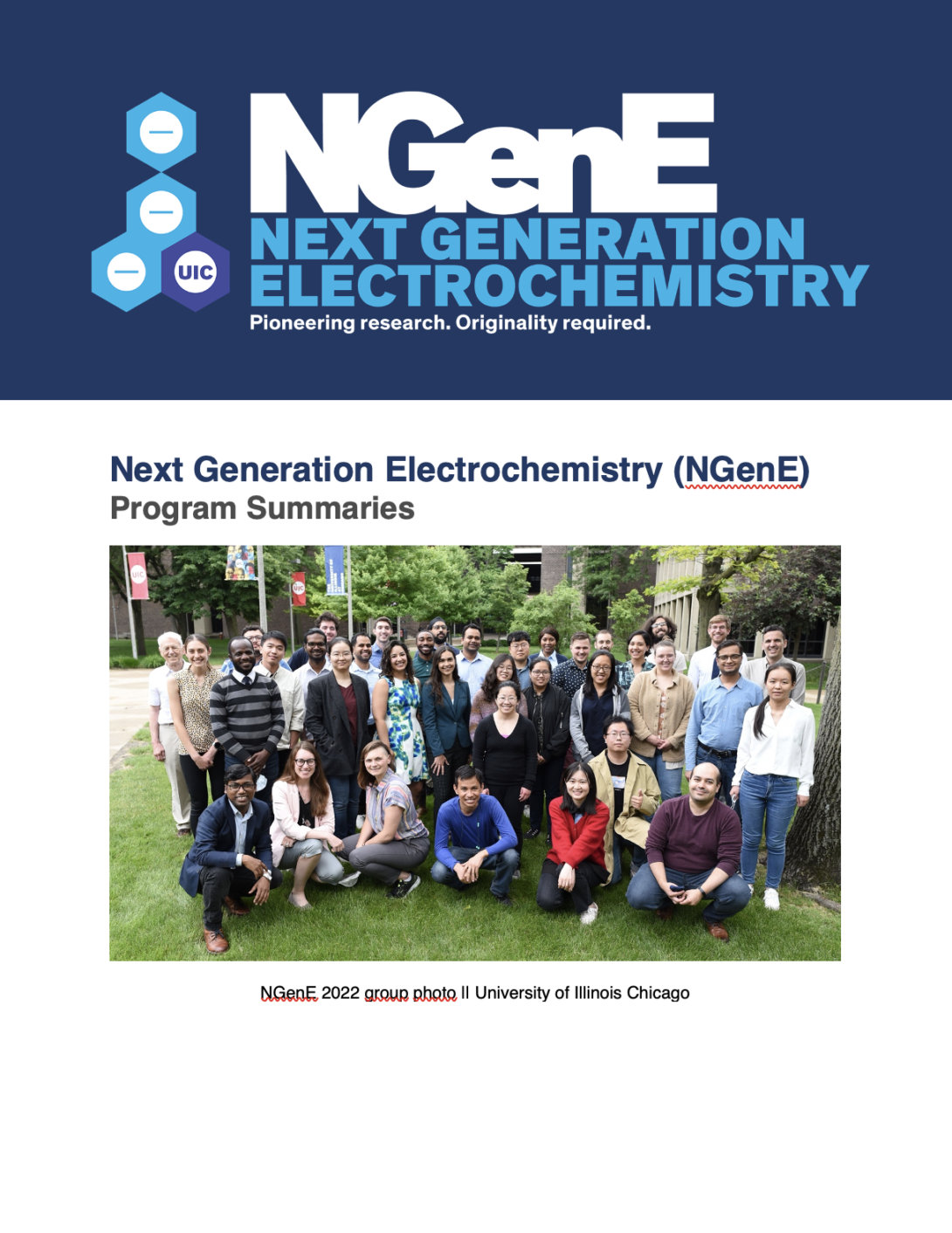
NGenE has met every summer since 2016 — either in Chicago or virtually (2020 and 2021) — to explore pioneering questions in electrochemistry. This document is a summary of those programs, affiliated faculty, topics, and partnering organization. Thanks to all those that have made NGenE possible.
NGenE Published Papers Heading link
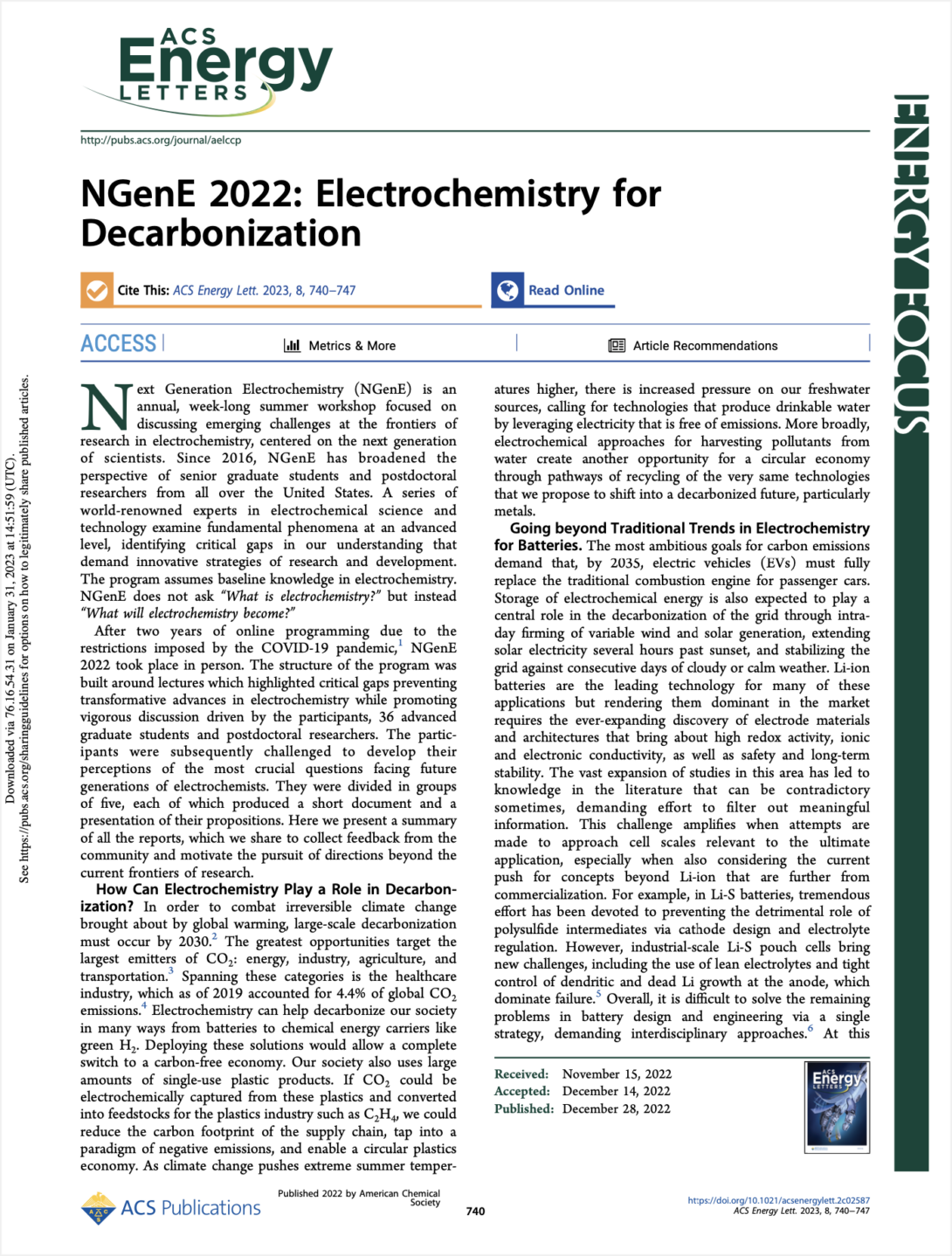
NGenE 2022: Electrochemistry for Decarbonization
ACS Energy Lett. 2023, 8, 1, 740–747
Jordi Cabana*, Thomas Alaan, George W. Crabtree, Po-Wei Huang, Akash Jain, Megan Murphy, Jeanne N’Diaye, Kasinath Ojha, George Agbeworvi, Helen Bergstrom, Simon Gersib, Hassan Harb, Adrien Stejer, Génesis Quiles-Galarza, Oliver Rodriguez, Isabella Caruso, Josué M. Gonçalves, Grace Y. Chen, Carlos A. Fernández, Hanqing Pan, Kabian Ritter, Yingjie Yang, Haozhe Zhang, Ana Cristina García-Álvarez, Stefan Ilic, Khagesh Kumar, Rachel Silcox, Yu Yao, Hakhyeon Song, Stoyan Stoyanov, Mohit Saraf, Celine H. Chen, S. M. Supundrika Subasinghe, Reginaldo Gomes, Shuangyan Lang, Eamonn Murphy, Arashdeep Singh Thind, and Yu Zheng
After two years of online programming due to the restrictions imposed by the COVID-19 pandemic, (1) NGenE 2022 took place in person. The structure of the program was built around lectures which highlighted critical gaps preventing transformative advances in electrochemistry while promoting vigorous discussion driven by the participants, 36 advanced graduate students and postdoctoral researchers. The participants were subsequently challenged to develop their perceptions of the most crucial questions facing future generations of electrochemists. They were divided in groups of five, each of which produced a short document and a presentation of their propositions. Here we present a summary of all the reports, which we share to collect feedback from the community and motivate the pursuit of directions beyond the current frontiers of research.
NGenE Published Paper 2 Heading link
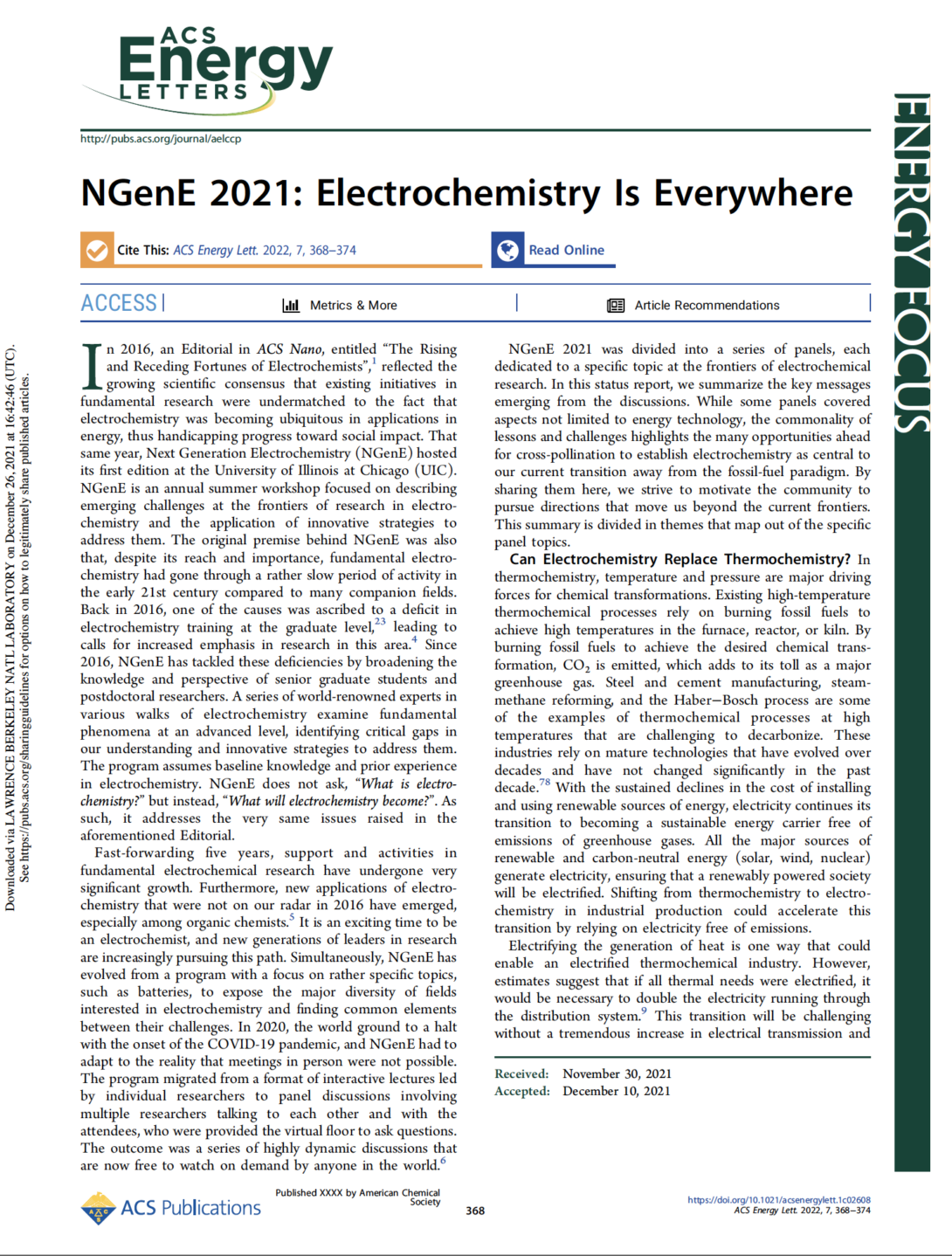
NGenE 2021: Electrochemistry Is Everywhere
ACS Energy Lett. 2022, 7, 1, 368–374
Jordi Cabana*, Thomas Alaan, George W. Crabtree, Marta C. Hatzell, Karthish Manthiram, Daniel A. Steingart, Iryna Zenyuk, Feng Jiao, Aleksandra Vojvodic, Jenny Y. Yang, Nitash P. Balsara, Kristin A. Persson, Donald J. Siegel, Christy L. Haynes, Janine Mauzeroll, Mei Shen, B. Jill Venton, Nina Balke, Joaquín Rodríguez-López, Debra R. Rolison, Reza Shahbazian-Yassar, Venkat Srinivasan, Santanu Chaudhuri, Adrien Couet, and Jason Hattrick-Simpers
NGenE 2021 was divided into a series of panels, each dedicated to a specific topic at the frontiers of electrochemical research. In this status report, we summarize the key messages emerging from the discussions. While some panels covered aspects not limited to energy technology, the commonality of lessons and challenges highlights the many opportunities ahead for cross-pollination to establish electrochemistry as central to our current transition away from the fossil-fuel paradigm. By sharing them here, we strive to motivate the community to pursue directions that move us beyond the current frontiers. This summary is divided in themes that map out of the specific panel topics.
Livestreams of NGenE Programs Heading link
NGenE 2021: Inescapable
Recent years have witnessed a boom in research areas leveraging electrochemistry for diverse uses and applications. The sixth annual Next Generational Electrochemistry Workshop—NGenE 2021—showcases the stunning breadth of topics that now depend on advances in electrochemical knowledge. Simultaneously, NGenE 2021 highlights how many unresolved questions cut across possible applications, meaning that progress at a fundamental level can have a widespread technological and social impact.
NGenE 2020 Heading link
NGenE 2020: Concentrate
Electrochemistry is central to fields as varied as energy storage, water treatment and neuroscience. However, the concepts that underlie the research barriers in this field are often similar, meaning that they can be traced back to a core challenge in electrochemistry. In turn, the knowledge of electrochemistry developed for one field could offer clues for new research directions in other fields. NGenE 5.0 aims both to foster cross-pollination of ideas from seemingly different fields linked by electrochemistry and to identify fundamental challenges that transcend fields, pointing at research directions with potential for very broad impact. Faculty will lay out a series of critical unresolved questions that must become the priority of the next generation of electrochemists, motivating their importance through experience and future societal needs.
Signup for NGenE Updates Heading link
Interested in updates? Signup below!
